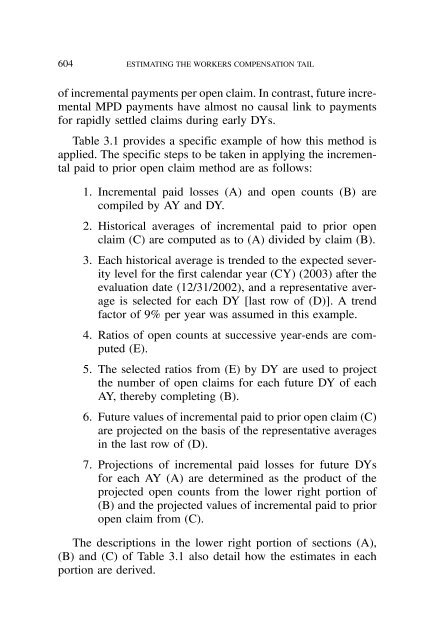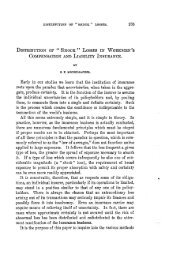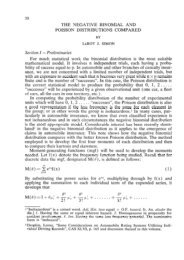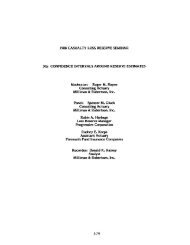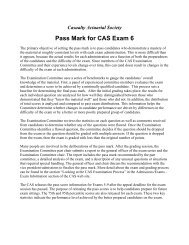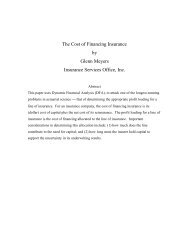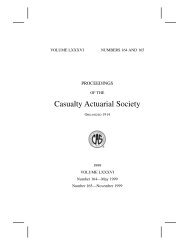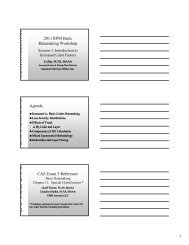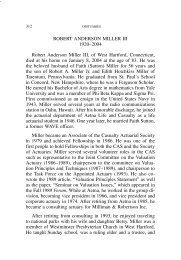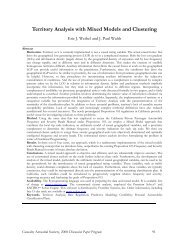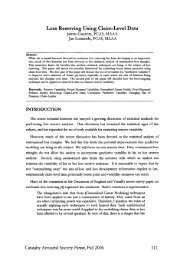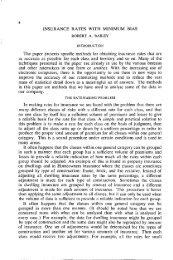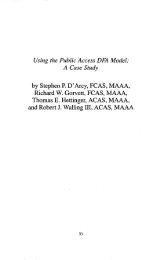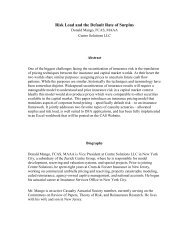- Page 1 and 2:
VOLUME XCII NUMBERS 176 and 177PROC
- Page 3 and 4:
FOREWORDActuarial science originate
- Page 5 and 6:
2005 PROCEEDINGSCONTENTS OF VOLUME
- Page 7 and 8:
2005 PROCEEDINGSCONTENTS OF VOLUME
- Page 9:
Editorial Committee, Proceedings Ed
- Page 12 and 13:
2 AN EXAMINATION OF THE INFLUENCE O
- Page 14 and 15:
4 AN EXAMINATION OF THE INFLUENCE O
- Page 16 and 17:
6 AN EXAMINATION OF THE INFLUENCE O
- Page 18 and 19:
8 AN EXAMINATION OF THE INFLUENCE O
- Page 20 and 21:
10 AN EXAMINATION OF THE INFLUENCE
- Page 22 and 23:
12 AN EXAMINATION OF THE INFLUENCE
- Page 24 and 25:
14 AN EXAMINATION OF THE INFLUENCE
- Page 26 and 27:
16 AN EXAMINATION OF THE INFLUENCE
- Page 28 and 29:
18 AN EXAMINATION OF THE INFLUENCE
- Page 30 and 31:
20 AN EXAMINATION OF THE INFLUENCE
- Page 32 and 33:
22 AN EXAMINATION OF THE INFLUENCE
- Page 34 and 35:
24 AN EXAMINATION OF THE INFLUENCE
- Page 36 and 37:
26 AN EXAMINATION OF THE INFLUENCE
- Page 39 and 40:
AN EXAMINATION OF THE INFLUENCE OF
- Page 41 and 42:
RISKINESS LEVERAGE MODELSRODNEY KRE
- Page 43 and 44:
RISKINESS LEVERAGE MODELS 33There a
- Page 45 and 46:
RISKINESS LEVERAGE MODELS 35where f
- Page 47 and 48:
RISKINESS LEVERAGE MODELS 37where a
- Page 49 and 50:
RISKINESS LEVERAGE MODELS 39Various
- Page 51 and 52:
RISKINESS LEVERAGE MODELS 41Then, f
- Page 53 and 54:
RISKINESS LEVERAGE MODELS 43This fo
- Page 55 and 56:
RISKINESS LEVERAGE MODELS 45This ri
- Page 57 and 58:
RISKINESS LEVERAGE MODELS 47differe
- Page 59 and 60:
RISKINESS LEVERAGE MODELS 49The las
- Page 61 and 62:
RISKINESS LEVERAGE MODELS 51ple. Th
- Page 63 and 64:
RISKINESS LEVERAGE MODELS 53the TVA
- Page 65 and 66:
RISKINESS LEVERAGE MODELS 55We also
- Page 67 and 68:
RISKINESS LEVERAGE MODELS 57Mean Va
- Page 69 and 70:
RISKINESS LEVERAGE MODELS 59APPENDI
- Page 71 and 72:
DISCUSSION OF A PAPER PRESENTED AT
- Page 73 and 74:
RISKINESS LEVERAGE MODELS 63known t
- Page 75 and 76:
RISKINESS LEVERAGE MODELS 65to be a
- Page 77 and 78:
RISKINESS LEVERAGE MODELS 67implies
- Page 79 and 80:
RISKINESS LEVERAGE MODELS 69bad res
- Page 81 and 82:
RISKINESS LEVERAGE MODELS 71a maxim
- Page 83 and 84:
RISKINESS LEVERAGE MODELS 734. INTE
- Page 85 and 86:
RISKINESS LEVERAGE MODELS 75the two
- Page 87 and 88:
RISKINESS LEVERAGE MODELS 77that a
- Page 89 and 90:
RISKINESS LEVERAGE MODELS 79REFEREN
- Page 91 and 92:
RISKINESS LEVERAGE MODELS 81EXHIBIT
- Page 93 and 94:
RISKINESS LEVERAGE MODELS 83
- Page 95 and 96:
RISKINESS LEVERAGE MODELS 85
- Page 97 and 98:
RISKINESS LEVERAGE MODELS 87
- Page 99 and 100:
WHY LARGER RISKS HAVE SMALLER INSUR
- Page 101 and 102:
WHY LARGER RISKS HAVE SMALLER INSUR
- Page 103 and 104:
WHY LARGER RISKS HAVE SMALLER INSUR
- Page 105 and 106:
WHY LARGER RISKS HAVE SMALLER INSUR
- Page 107 and 108:
WHY LARGER RISKS HAVE SMALLER INSUR
- Page 109 and 110:
WHY LARGER RISKS HAVE SMALLER INSUR
- Page 111 and 112:
WHY LARGER RISKS HAVE SMALLER INSUR
- Page 113 and 114:
WHY LARGER RISKS HAVE SMALLER INSUR
- Page 115 and 116:
WHY LARGER RISKS HAVE SMALLER INSUR
- Page 117 and 118:
WHY LARGER RISKS HAVE SMALLER INSUR
- Page 119 and 120:
WHY LARGER RISKS HAVE SMALLER INSUR
- Page 121 and 122:
WHY LARGER RISKS HAVE SMALLER INSUR
- Page 123 and 124:
WHY LARGER RISKS HAVE SMALLER INSUR
- Page 125 and 126:
WHY LARGER RISKS HAVE SMALLER INSUR
- Page 127 and 128:
WHY LARGER RISKS HAVE SMALLER INSUR
- Page 129 and 130:
WHY LARGER RISKS HAVE SMALLER INSUR
- Page 131 and 132:
WHY LARGER RISKS HAVE SMALLER INSUR
- Page 133 and 134:
WHY LARGER RISKS HAVE SMALLER INSUR
- Page 135 and 136:
WHY LARGER RISKS HAVE SMALLER INSUR
- Page 137 and 138:
WHY LARGER RISKS HAVE SMALLER INSUR
- Page 139 and 140:
WHY LARGER RISKS HAVE SMALLER INSUR
- Page 141 and 142:
WHY LARGER RISKS HAVE SMALLER INSUR
- Page 143 and 144:
WHY LARGER RISKS HAVE SMALLER INSUR
- Page 145 and 146:
WHY LARGER RISKS HAVE SMALLER INSUR
- Page 147 and 148:
WHY LARGER RISKS HAVE SMALLER INSUR
- Page 149 and 150:
WHY LARGER RISKS HAVE SMALLER INSUR
- Page 151 and 152:
WHY LARGER RISKS HAVE SMALLER INSUR
- Page 153 and 154:
WHY LARGER RISKS HAVE SMALLER INSUR
- Page 155 and 156:
WHY LARGER RISKS HAVE SMALLER INSUR
- Page 157 and 158:
WHY LARGER RISKS HAVE SMALLER INSUR
- Page 159 and 160:
WHY LARGER RISKS HAVE SMALLER INSUR
- Page 161 and 162:
ADDRESS TO NEW MEMBERS 151ateship a
- Page 163 and 164:
ADDRESS TO NEW MEMBERS 153You shoul
- Page 165 and 166:
ADDRESS TO NEW MEMBERS 155strength
- Page 167 and 168:
MINUTES OF THE 2005 CAS SPRING MEET
- Page 169 and 170:
MINUTES OF THE 2005 SPRING MEETING
- Page 171 and 172:
MINUTES OF THE 2005 SPRING MEETING
- Page 173 and 174:
MINUTES OF THE 2005 SPRING MEETING
- Page 175 and 176:
MINUTES OF THE 2005 SPRING MEETING
- Page 177 and 178:
MINUTES OF THE 2005 SPRING MEETING
- Page 179 and 180:
MINUTES OF THE 2005 SPRING MEETING
- Page 181 and 182:
MINUTES OF THE 2005 SPRING MEETING
- Page 183 and 184:
MINUTES OF THE 2005 SPRING MEETING
- Page 185 and 186:
MINUTES OF THE 2005 SPRING MEETING
- Page 187 and 188:
Volume XCII, Part 2 No. 177PROCEEDI
- Page 189 and 190:
MODELING FINANCIAL SCENARIOS 179Bab
- Page 191 and 192:
MODELING FINANCIAL SCENARIOS 181tur
- Page 193 and 194:
MODELING FINANCIAL SCENARIOS 183the
- Page 195 and 196:
MODELING FINANCIAL SCENARIOS 185Ho
- Page 197 and 198:
MODELING FINANCIAL SCENARIOS 187rat
- Page 199 and 200:
MODELING FINANCIAL SCENARIOS 189sto
- Page 201 and 202:
MODELING FINANCIAL SCENARIOS 191the
- Page 203 and 204:
MODELING FINANCIAL SCENARIOS 193Dyn
- Page 205 and 206:
MODELING FINANCIAL SCENARIOS 195(ht
- Page 207 and 208:
MODELING FINANCIAL SCENARIOS 197In
- Page 209 and 210:
MODELING FINANCIAL SCENARIOS 199equ
- Page 211 and 212:
MODELING FINANCIAL SCENARIOS 201neg
- Page 213 and 214:
MODELING FINANCIAL SCENARIOS 203ide
- Page 215 and 216:
MODELING FINANCIAL SCENARIOS 205tra
- Page 217 and 218:
MODELING FINANCIAL SCENARIOS 207mod
- Page 219 and 220:
MODELING FINANCIAL SCENARIOS 209TAB
- Page 221 and 222:
MODELING FINANCIAL SCENARIOS 211mak
- Page 223 and 224:
MODELING FINANCIAL SCENARIOS 213FIG
- Page 225 and 226:
MODELING FINANCIAL SCENARIOS 215str
- Page 227 and 228:
MODELING FINANCIAL SCENARIOS 217FIG
- Page 229 and 230:
MODELING FINANCIAL SCENARIOS 219FIG
- Page 231 and 232:
MODELING FINANCIAL SCENARIOS 221FIG
- Page 233 and 234:
MODELING FINANCIAL SCENARIOS 223are
- Page 235 and 236:
MODELING FINANCIAL SCENARIOS 225FIG
- Page 237 and 238:
MODELING FINANCIAL SCENARIOS 227FIG
- Page 239 and 240:
MODELING FINANCIAL SCENARIOS 229FIG
- Page 241 and 242:
MODELING FINANCIAL SCENARIOS 231
- Page 243 and 244:
MODELING FINANCIAL SCENARIOS 233ete
- Page 245 and 246:
MODELING FINANCIAL SCENARIOS 235[10
- Page 247 and 248:
MODELING FINANCIAL SCENARIOS 237[30
- Page 249 and 250:
WHEN CAN ACCIDENT YEARS BE REGARDED
- Page 251 and 252:
WHEN CAN ACCIDENT YEARS BE REGARDED
- Page 253 and 254:
WHEN CAN ACCIDENT YEARS BE REGARDED
- Page 255 and 256:
WHEN CAN ACCIDENT YEARS BE REGARDED
- Page 257 and 258:
WHEN CAN ACCIDENT YEARS BE REGARDED
- Page 259 and 260:
WHEN CAN ACCIDENT YEARS BE REGARDED
- Page 261 and 262:
WHEN CAN ACCIDENT YEARS BE REGARDED
- Page 263 and 264:
WHEN CAN ACCIDENT YEARS BE REGARDED
- Page 265 and 266:
WHEN CAN ACCIDENT YEARS BE REGARDED
- Page 267 and 268:
THE APPLICATION OF FUNDAMENTAL VALU
- Page 269 and 270:
THE APPLICATION OF FUNDAMENTAL VALU
- Page 271 and 272:
THE APPLICATION OF FUNDAMENTAL VALU
- Page 273 and 274:
THE APPLICATION OF FUNDAMENTAL VALU
- Page 275 and 276:
THE APPLICATION OF FUNDAMENTAL VALU
- Page 277 and 278:
THE APPLICATION OF FUNDAMENTAL VALU
- Page 279 and 280:
THE APPLICATION OF FUNDAMENTAL VALU
- Page 281 and 282:
THE APPLICATION OF FUNDAMENTAL VALU
- Page 283 and 284:
THE APPLICATION OF FUNDAMENTAL VALU
- Page 285 and 286:
THE APPLICATION OF FUNDAMENTAL VALU
- Page 287 and 288:
THE APPLICATION OF FUNDAMENTAL VALU
- Page 289 and 290:
THE APPLICATION OF FUNDAMENTAL VALU
- Page 291 and 292:
THE APPLICATION OF FUNDAMENTAL VALU
- Page 293 and 294:
THE APPLICATION OF FUNDAMENTAL VALU
- Page 295 and 296:
THE APPLICATION OF FUNDAMENTAL VALU
- Page 297 and 298:
THE APPLICATION OF FUNDAMENTAL VALU
- Page 299 and 300:
THE APPLICATION OF FUNDAMENTAL VALU
- Page 301 and 302:
THE APPLICATION OF FUNDAMENTAL VALU
- Page 303 and 304:
THE APPLICATION OF FUNDAMENTAL VALU
- Page 305 and 306:
THE APPLICATION OF FUNDAMENTAL VALU
- Page 307 and 308:
THE APPLICATION OF FUNDAMENTAL VALU
- Page 309 and 310:
THE APPLICATION OF FUNDAMENTAL VALU
- Page 311 and 312:
THE APPLICATION OF FUNDAMENTAL VALU
- Page 313 and 314:
THE APPLICATION OF FUNDAMENTAL VALU
- Page 315 and 316:
THE APPLICATION OF FUNDAMENTAL VALU
- Page 317 and 318:
THE APPLICATION OF FUNDAMENTAL VALU
- Page 319 and 320:
THE APPLICATION OF FUNDAMENTAL VALU
- Page 321 and 322:
THE APPLICATION OF FUNDAMENTAL VALU
- Page 323 and 324:
THE APPLICATION OF FUNDAMENTAL VALU
- Page 325 and 326:
THE APPLICATION OF FUNDAMENTAL VALU
- Page 327 and 328:
THE APPLICATION OF FUNDAMENTAL VALU
- Page 329 and 330:
THE APPLICATION OF FUNDAMENTAL VALU
- Page 331 and 332:
THE APPLICATION OF FUNDAMENTAL VALU
- Page 333 and 334:
THE APPLICATION OF FUNDAMENTAL VALU
- Page 335 and 336:
THE APPLICATION OF FUNDAMENTAL VALU
- Page 337 and 338:
THE APPLICATION OF FUNDAMENTAL VALU
- Page 339 and 340:
THE APPLICATION OF FUNDAMENTAL VALU
- Page 341 and 342:
THE APPLICATION OF FUNDAMENTAL VALU
- Page 343 and 344:
THE APPLICATION OF FUNDAMENTAL VALU
- Page 345 and 346:
THE APPLICATION OF FUNDAMENTAL VALU
- Page 347 and 348:
THE APPLICATION OF FUNDAMENTAL VALU
- Page 349 and 350:
THE APPLICATION OF FUNDAMENTAL VALU
- Page 351 and 352:
THE APPLICATION OF FUNDAMENTAL VALU
- Page 353 and 354:
THE APPLICATION OF FUNDAMENTAL VALU
- Page 355 and 356:
THE APPLICATION OF FUNDAMENTAL VALU
- Page 357 and 358:
THE APPLICATION OF FUNDAMENTAL VALU
- Page 359 and 360:
THE APPLICATION OF FUNDAMENTAL VALU
- Page 361 and 362:
THE APPLICATION OF FUNDAMENTAL VALU
- Page 363 and 364:
THE APPLICATION OF FUNDAMENTAL VALU
- Page 365 and 366:
THE APPLICATION OF FUNDAMENTAL VALU
- Page 367 and 368:
THE APPLICATION OF FUNDAMENTAL VALU
- Page 369 and 370:
THE APPLICATION OF FUNDAMENTAL VALU
- Page 371 and 372:
THE APPLICATION OF FUNDAMENTAL VALU
- Page 373 and 374:
THE APPLICATION OF FUNDAMENTAL VALU
- Page 375 and 376:
THE APPLICATION OF FUNDAMENTAL VALU
- Page 377 and 378:
THE APPLICATION OF FUNDAMENTAL VALU
- Page 379 and 380:
THE APPLICATION OF FUNDAMENTAL VALU
- Page 381 and 382:
THE APPLICATION OF FUNDAMENTAL VALU
- Page 383 and 384:
THE APPLICATION OF FUNDAMENTAL VALU
- Page 385 and 386:
THE APPLICATION OF FUNDAMENTAL VALU
- Page 387 and 388:
THE APPLICATION OF FUNDAMENTAL VALU
- Page 389 and 390:
THE APPLICATION OF FUNDAMENTAL VALU
- Page 391 and 392:
THE APPLICATION OF FUNDAMENTAL VALU
- Page 393 and 394:
THE APPLICATION OF FUNDAMENTAL VALU
- Page 395 and 396:
THE APPLICATION OF FUNDAMENTAL VALU
- Page 397 and 398:
THE APPLICATION OF FUNDAMENTAL VALU
- Page 399 and 400:
THE APPLICATION OF FUNDAMENTAL VALU
- Page 401 and 402:
THE APPLICATION OF FUNDAMENTAL VALU
- Page 403 and 404:
THE APPLICATION OF FUNDAMENTAL VALU
- Page 405 and 406:
THE APPLICATION OF FUNDAMENTAL VALU
- Page 407 and 408:
THE APPLICATION OF FUNDAMENTAL VALU
- Page 409 and 410:
THE APPLICATION OF FUNDAMENTAL VALU
- Page 411 and 412:
THE APPLICATION OF FUNDAMENTAL VALU
- Page 413 and 414:
THE APPLICATION OF FUNDAMENTAL VALU
- Page 415 and 416:
THE APPLICATION OF FUNDAMENTAL VALU
- Page 417 and 418:
THE APPLICATION OF FUNDAMENTAL VALU
- Page 419 and 420:
THE APPLICATION OF FUNDAMENTAL VALU
- Page 421 and 422:
THE APPLICATION OF FUNDAMENTAL VALU
- Page 423 and 424:
THE APPLICATION OF FUNDAMENTAL VALU
- Page 425 and 426:
THE APPLICATION OF FUNDAMENTAL VALU
- Page 427 and 428:
THE APPLICATION OF FUNDAMENTAL VALU
- Page 429 and 430:
THE APPLICATION OF FUNDAMENTAL VALU
- Page 431 and 432:
THE APPLICATION OF FUNDAMENTAL VALU
- Page 433 and 434:
THE APPLICATION OF FUNDAMENTAL VALU
- Page 435 and 436:
THE APPLICATION OF FUNDAMENTAL VALU
- Page 437 and 438:
THE APPLICATION OF FUNDAMENTAL VALU
- Page 439 and 440:
THE APPLICATION OF FUNDAMENTAL VALU
- Page 441 and 442:
THE APPLICATION OF FUNDAMENTAL VALU
- Page 443 and 444:
THE APPLICATION OF FUNDAMENTAL VALU
- Page 445 and 446:
THE APPLICATION OF FUNDAMENTAL VALU
- Page 447 and 448:
THE APPLICATION OF FUNDAMENTAL VALU
- Page 449 and 450:
THE APPLICATION OF FUNDAMENTAL VALU
- Page 451 and 452:
THE APPLICATION OF FUNDAMENTAL VALU
- Page 453 and 454:
THE APPLICATION OF FUNDAMENTAL VALU
- Page 455 and 456:
THE APPLICATION OF FUNDAMENTAL VALU
- Page 457 and 458:
THE APPLICATION OF FUNDAMENTAL VALU
- Page 459 and 460:
THE APPLICATION OF FUNDAMENTAL VALU
- Page 461 and 462:
THE APPLICATION OF FUNDAMENTAL VALU
- Page 463 and 464:
THE APPLICATION OF FUNDAMENTAL VALU
- Page 465 and 466:
THE APPLICATION OF FUNDAMENTAL VALU
- Page 467 and 468:
THE APPLICATION OF FUNDAMENTAL VALU
- Page 469 and 470:
THE APPLICATION OF FUNDAMENTAL VALU
- Page 471 and 472:
THE APPLICATION OF FUNDAMENTAL VALU
- Page 473 and 474:
A NEW METHOD OF ESTIMATING LOSS RES
- Page 475 and 476:
A NEW METHOD OF ESTIMATING LOSS RES
- Page 477 and 478:
A NEW METHOD OF ESTIMATING LOSS RES
- Page 479 and 480:
A NEW METHOD OF ESTIMATING LOSS RES
- Page 481 and 482:
A NEW METHOD OF ESTIMATING LOSS RES
- Page 483 and 484:
A NEW METHOD OF ESTIMATING LOSS RES
- Page 485 and 486:
A NEW METHOD OF ESTIMATING LOSS RES
- Page 487 and 488:
A NEW METHOD OF ESTIMATING LOSS RES
- Page 489 and 490:
A NEW METHOD OF ESTIMATING LOSS RES
- Page 491 and 492:
A NEW METHOD OF ESTIMATING LOSS RES
- Page 493 and 494:
A NEW METHOD OF ESTIMATING LOSS RES
- Page 495 and 496:
A NEW METHOD OF ESTIMATING LOSS RES
- Page 497 and 498:
ARCHITECTURE FOR RESIDENTIAL PROPER
- Page 499 and 500:
ARCHITECTURE FOR RESIDENTIAL PROPER
- Page 501 and 502:
ARCHITECTURE FOR RESIDENTIAL PROPER
- Page 503 and 504:
ARCHITECTURE FOR RESIDENTIAL PROPER
- Page 505 and 506:
ARCHITECTURE FOR RESIDENTIAL PROPER
- Page 507 and 508:
ARCHITECTURE FOR RESIDENTIAL PROPER
- Page 509 and 510:
ARCHITECTURE FOR RESIDENTIAL PROPER
- Page 511 and 512:
ARCHITECTURE FOR RESIDENTIAL PROPER
- Page 513 and 514:
ARCHITECTURE FOR RESIDENTIAL PROPER
- Page 515 and 516:
ARCHITECTURE FOR RESIDENTIAL PROPER
- Page 517 and 518:
ARCHITECTURE FOR RESIDENTIAL PROPER
- Page 519 and 520:
ARCHITECTURE FOR RESIDENTIAL PROPER
- Page 521 and 522:
ARCHITECTURE FOR RESIDENTIAL PROPER
- Page 523 and 524:
ARCHITECTURE FOR RESIDENTIAL PROPER
- Page 525 and 526:
ARCHITECTURE FOR RESIDENTIAL PROPER
- Page 527 and 528:
ARCHITECTURE FOR RESIDENTIAL PROPER
- Page 529 and 530:
ARCHITECTURE FOR RESIDENTIAL PROPER
- Page 531 and 532:
ARCHITECTURE FOR RESIDENTIAL PROPER
- Page 533 and 534:
ARCHITECTURE FOR RESIDENTIAL PROPER
- Page 535 and 536:
ARCHITECTURE FOR RESIDENTIAL PROPER
- Page 537 and 538:
ARCHITECTURE FOR RESIDENTIAL PROPER
- Page 539 and 540:
ARCHITECTURE FOR RESIDENTIAL PROPER
- Page 541 and 542:
ARCHITECTURE FOR RESIDENTIAL PROPER
- Page 543 and 544:
ARCHITECTURE FOR RESIDENTIAL PROPER
- Page 545 and 546:
ARCHITECTURE FOR RESIDENTIAL PROPER
- Page 547 and 548:
ARCHITECTURE FOR RESIDENTIAL PROPER
- Page 549 and 550:
ARCHITECTURE FOR RESIDENTIAL PROPER
- Page 551 and 552:
ARCHITECTURE FOR RESIDENTIAL PROPER
- Page 553 and 554:
ARCHITECTURE FOR RESIDENTIAL PROPER
- Page 555 and 556:
ARCHITECTURE FOR RESIDENTIAL PROPER
- Page 557 and 558:
ARCHITECTURE FOR RESIDENTIAL PROPER
- Page 559 and 560:
ARCHITECTURE FOR RESIDENTIAL PROPER
- Page 561 and 562:
ARCHITECTURE FOR RESIDENTIAL PROPER
- Page 563 and 564: ARCHITECTURE FOR RESIDENTIAL PROPER
- Page 565 and 566: ARCHITECTURE FOR RESIDENTIAL PROPER
- Page 567 and 568: ARCHITECTURE FOR RESIDENTIAL PROPER
- Page 569 and 570: ARCHITECTURE FOR RESIDENTIAL PROPER
- Page 571 and 572: ARCHITECTURE FOR RESIDENTIAL PROPER
- Page 573 and 574: ARCHITECTURE FOR RESIDENTIAL PROPER
- Page 575 and 576: ARCHITECTURE FOR RESIDENTIAL PROPER
- Page 577 and 578: ARCHITECTURE FOR RESIDENTIAL PROPER
- Page 579 and 580: ARCHITECTURE FOR RESIDENTIAL PROPER
- Page 581 and 582: ARCHITECTURE FOR RESIDENTIAL PROPER
- Page 583 and 584: ARCHITECTURE FOR RESIDENTIAL PROPER
- Page 585 and 586: ARCHITECTURE FOR RESIDENTIAL PROPER
- Page 587 and 588: ARCHITECTURE FOR RESIDENTIAL PROPER
- Page 589 and 590: ESTIMATING THE WORKERS COMPENSATION
- Page 591 and 592: ESTIMATING THE WORKERS COMPENSATION
- Page 593 and 594: ESTIMATING THE WORKERS COMPENSATION
- Page 595 and 596: ESTIMATING THE WORKERS COMPENSATION
- Page 597 and 598: ESTIMATING THE WORKERS COMPENSATION
- Page 599 and 600: ESTIMATING THE WORKERS COMPENSATION
- Page 601 and 602: ESTIMATING THE WORKERS COMPENSATION
- Page 603 and 604: ESTIMATING THE WORKERS COMPENSATION
- Page 605 and 606: ESTIMATING THE WORKERS COMPENSATION
- Page 607 and 608: ESTIMATING THE WORKERS COMPENSATION
- Page 609 and 610: ESTIMATING THE WORKERS COMPENSATION
- Page 611 and 612: ESTIMATING THE WORKERS COMPENSATION
- Page 613: ESTIMATING THE WORKERS COMPENSATION
- Page 617 and 618: ESTIMATING THE WORKERS COMPENSATION
- Page 619 and 620: ESTIMATING THE WORKERS COMPENSATION
- Page 621 and 622: ESTIMATING THE WORKERS COMPENSATION
- Page 623 and 624: ESTIMATING THE WORKERS COMPENSATION
- Page 625 and 626: ESTIMATING THE WORKERS COMPENSATION
- Page 627 and 628: ESTIMATING THE WORKERS COMPENSATION
- Page 629 and 630: ESTIMATING THE WORKERS COMPENSATION
- Page 631 and 632: ESTIMATING THE WORKERS COMPENSATION
- Page 633 and 634: ESTIMATING THE WORKERS COMPENSATION
- Page 635 and 636: ESTIMATING THE WORKERS COMPENSATION
- Page 637 and 638: ESTIMATING THE WORKERS COMPENSATION
- Page 639 and 640: ESTIMATING THE WORKERS COMPENSATION
- Page 641 and 642: ESTIMATING THE WORKERS COMPENSATION
- Page 643 and 644: ESTIMATING THE WORKERS COMPENSATION
- Page 645 and 646: ESTIMATING THE WORKERS COMPENSATION
- Page 647 and 648: ESTIMATING THE WORKERS COMPENSATION
- Page 649 and 650: ESTIMATING THE WORKERS COMPENSATION
- Page 651 and 652: ESTIMATING THE WORKERS COMPENSATION
- Page 653 and 654: ESTIMATING THE WORKERS COMPENSATION
- Page 655 and 656: ESTIMATING THE WORKERS COMPENSATION
- Page 657 and 658: ESTIMATING THE WORKERS COMPENSATION
- Page 659 and 660: ESTIMATING THE WORKERS COMPENSATION
- Page 661 and 662: ESTIMATING THE WORKERS COMPENSATION
- Page 663 and 664: ESTIMATING THE WORKERS COMPENSATION
- Page 665 and 666:
ESTIMATING THE WORKERS COMPENSATION
- Page 667 and 668:
ESTIMATING THE WORKERS COMPENSATION
- Page 669 and 670:
ESTIMATING THE WORKERS COMPENSATION
- Page 671 and 672:
ESTIMATING THE WORKERS COMPENSATION
- Page 673 and 674:
ESTIMATING THE WORKERS COMPENSATION
- Page 675 and 676:
ESTIMATING THE WORKERS COMPENSATION
- Page 677 and 678:
ESTIMATING THE WORKERS COMPENSATION
- Page 679 and 680:
ESTIMATING THE WORKERS COMPENSATION
- Page 681 and 682:
ESTIMATING THE WORKERS COMPENSATION
- Page 683 and 684:
ESTIMATING THE WORKERS COMPENSATION
- Page 685 and 686:
ESTIMATING THE WORKERS COMPENSATION
- Page 687 and 688:
ESTIMATING THE WORKERS COMPENSATION
- Page 689 and 690:
INCORPORATION OF FIXED EXPENSESGEOF
- Page 691 and 692:
INCORPORATION OF FIXED EXPENSES 681
- Page 693 and 694:
INCORPORATION OF FIXED EXPENSES 683
- Page 695 and 696:
INCORPORATION OF FIXED EXPENSES 685
- Page 697 and 698:
INCORPORATION OF FIXED EXPENSES 687
- Page 699 and 700:
INCORPORATION OF FIXED EXPENSES 689
- Page 701 and 702:
INCORPORATION OF FIXED EXPENSES 691
- Page 703 and 704:
INCORPORATION OF FIXED EXPENSES 693
- Page 705 and 706:
INCORPORATION OF FIXED EXPENSES 695
- Page 707 and 708:
INCORPORATION OF FIXED EXPENSES 697
- Page 709 and 710:
INCORPORATION OF FIXED EXPENSES 699
- Page 711 and 712:
INCORPORATION OF FIXED EXPENSES 701
- Page 713 and 714:
INCORPORATION OF FIXED EXPENSES 703
- Page 715 and 716:
INCORPORATION OF FIXED EXPENSES 705
- Page 717 and 718:
INCORPORATION OF FIXED EXPENSES 707
- Page 719 and 720:
INCORPORATION OF FIXED EXPENSES 709
- Page 721 and 722:
INCORPORATION OF FIXED EXPENSES 711
- Page 723 and 724:
INCORPORATION OF FIXED EXPENSES 713
- Page 725 and 726:
INCORPORATION OF FIXED EXPENSES 715
- Page 727 and 728:
DISCUSSION OF PAPER PUBLISHED INVOL
- Page 729 and 730:
APPLICATION OF THE OPTION MARKET PA
- Page 731 and 732:
APPLICATION OF THE OPTION MARKET PA
- Page 733 and 734:
APPLICATION OF THE OPTION MARKET PA
- Page 735 and 736:
APPLICATION OF THE OPTION MARKET PA
- Page 737 and 738:
APPLICATION OF THE OPTION MARKET PA
- Page 739 and 740:
APPLICATION OF THE OPTION MARKET PA
- Page 741 and 742:
APPLICATION OF THE OPTION MARKET PA
- Page 743 and 744:
APPLICATION OF THE OPTION MARKET PA
- Page 745 and 746:
THE “MODIFIED BORNHUETTER-FERGUSO
- Page 747 and 748:
THE “MODIFIED BORNHUETTER-FERGUSO
- Page 749 and 750:
THE “MODIFIED BORNHUETTER-FERGUSO
- Page 751 and 752:
ADDRESS TO NEW MEMBERS-NOVEMBER 14,
- Page 753 and 754:
ADDRESS TO NEW MEMBERS 743Now to an
- Page 755 and 756:
PRESIDENTIAL ADDRESS-NOVEMBER 14, 2
- Page 757 and 758:
PRESIDENTIAL ADDRESS 747use of thes
- Page 759 and 760:
PRESIDENTIAL ADDRESS 749just lookin
- Page 761 and 762:
PRESIDENTIAL ADDRESS 751The quantif
- Page 763 and 764:
PRESIDENTIAL ADDRESS 753me keep my
- Page 765 and 766:
MINUTES OF THE 2005 CAS ANNUAL MEET
- Page 767 and 768:
MINUTES OF THE 2005 ANNUAL MEETING
- Page 769 and 770:
MINUTES OF THE 2005 ANNUAL MEETING
- Page 771 and 772:
MINUTES OF THE 2005 ANNUAL MEETING
- Page 773 and 774:
MINUTES OF THE 2005 ANNUAL MEETING
- Page 775 and 776:
MINUTES OF THE 2005 ANNUAL MEETING
- Page 777 and 778:
MINUTES OF THE 2005 ANNUAL MEETING
- Page 779 and 780:
MINUTES OF THE 2005 ANNUAL MEETING
- Page 781 and 782:
MINUTES OF THE 2005 ANNUAL MEETING
- Page 783 and 784:
MINUTES OF THE 2005 ANNUAL MEETING
- Page 785 and 786:
MINUTES OF THE 2005 ANNUAL MEETING
- Page 787 and 788:
MINUTES OF THE 2005 ANNUAL MEETING
- Page 789 and 790:
MINUTES OF THE 2005 ANNUAL MEETING
- Page 791 and 792:
REPORT OF THE VICE PRESIDENT—ADMI
- Page 793 and 794:
REPORT OF THE VICE PRESIDENT—ADMI
- Page 795 and 796:
REPORT OF THE VICE PRESIDENT—ADMI
- Page 797 and 798:
REPORT OF THE VICE PRESIDENT—ADMI
- Page 799 and 800:
REPORT OF THE VICE PRESIDENT-ADMINI
- Page 801 and 802:
2005 EXAMINATIONS—SUCCESSFUL CAND
- Page 803 and 804:
2005 EXAMINATIONS—SUCCESSFUL CAND
- Page 805 and 806:
2005 EXAMINATIONS—SUCCESSFUL CAND
- Page 807 and 808:
2005 EXAMINATIONS—SUCCESSFUL CAND
- Page 809 and 810:
2005 EXAMINATIONS—SUCCESSFUL CAND
- Page 811 and 812:
2005 EXAMINATIONS—SUCCESSFUL CAND
- Page 813 and 814:
2005 EXAMINATIONS—SUCCESSFUL CAND
- Page 815 and 816:
2005 EXAMINATIONS—SUCCESSFUL CAND
- Page 817 and 818:
2005 EXAMINATIONS—SUCCESSFUL CAND
- Page 819 and 820:
2005 EXAMINATIONS—SUCCESSFUL CAND
- Page 821 and 822:
2005 EXAMINATIONS—SUCCESSFUL CAND
- Page 823 and 824:
2005 EXAMINATIONS—SUCCESSFUL CAND
- Page 825 and 826:
2005 EXAMINATIONS—SUCCESSFUL CAND
- Page 827 and 828:
2005 EXAMINATIONS—SUCCESSFUL CAND
- Page 829 and 830:
2005 EXAMINATIONS—SUCCESSFUL CAND
- Page 831 and 832:
2005 EXAMINATIONS—SUCCESSFUL CAND
- Page 833 and 834:
OBITUARIESROBERT GRANT ESPIECLYDE H
- Page 835 and 836:
OBITUARIES 825SIDNEY M. HAMMER1931
- Page 837 and 838:
OBITUARIES 827J. GARY LaROSE1947—
- Page 839 and 840:
OBITUARIES 829PAUL J. SCHEEL SR.193
- Page 841 and 842:
OBITUARIES 831LEO M. STANKUSCirca 1
- Page 843 and 844:
INDEX TO VOLUME XCIIPage2005 EXAMIN
- Page 845 and 846:
835GRAVES, CLYDE H.INDEX—CONTINUE
- Page 847 and 848:
837INDEX—CONTINUEDREPORT OF THE V


